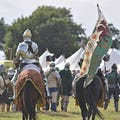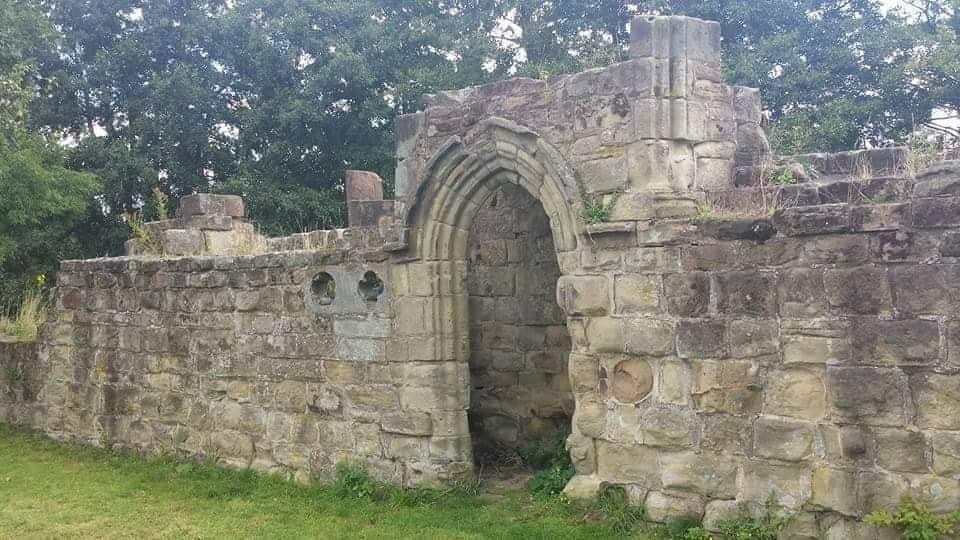On 21 August 1485, Henry Tudor was nearing the end of his march towards either immortality or death. It had been fourteen years since he had been forced into exile at the age of 14, three weeks since he had left France at the head of a modest army and two weeks since he had landed in his native Wales, ready for a gruelling march through hilly terrain into the heart of England. He knew he would eventually have to face the army of the man he was openly calling a usurper and tyrant, Richard III. Now, word had reached him Richard and his men were near.
The following is an extract from my book ‘Son of Prophecy: The Rise of Henry Tudor’, looking at this 24-48 hours before the battle that would change the life of Henry, and end the life of Richard. If you enjoy, please do consider picking up a copy - its available from Blackwells Books wherever you are in the world, and will help me continue to treat Vera.
On 19 August 1495, Henry and his army headed south-east out of Stafford, covering about seventeen miles until they reached the city walls of Lichfield, where they bedded down for the night. Very early the next morning, a refreshed Henry entered the town, and was ‘honourably received’ by the people, grateful for no disorder or violence. There was no time to waste, however, and onwards they pushed, picking up Watling Street and heading towards Tamworth. Henry had learned upon reaching Lichfield that his Lord Stanley had been there just three days earlier, and was now camped somewhere near Atherstone. His cautious stepfather, however, was still unwilling to combine their forces. Despite his unease at this situation, Henry had little choice but to press ahead.
Polydore Vergil, who partly composed his account from oral testimony provided by those present on the campaign, records a curious moment on the evening of 20 August when Henry became separated from his main host. Despite his ‘noble courage’, Henry was overwhelmed by a ‘great fear’ that the Stanleys would forsake him. Gathering a small band of trusted bodyguards, he sought some space away from his army, a moment of solitude to consider his options. Perhaps at his late stage, he even entertained notions of escape. Whilst absentmindedly wandering, however, Henry and his minders lost their bearings, and once night fell upon them, in the darkness couldn’t find their way back to the camp. There was genuine concern they would fall into the hands of Richard III’s foreriders, who were scouting the area.
When Henry’s army woke in the morning to find their leader strangely absent, many started to panic, worrying they had been deserted. Before disorder spread through the ranks, Henry made a timely reappearance, loudly proclaiming that the purpose of his brief withdrawal had been to receive ‘some good news’ from his ‘secret friends’. Morale was duly restored, and Henry called to his side his closest advisors to continue laying out their strategy. No more was said about this odd episode in which Henry may just have briefly lost his nerve.
Later that morning, the Tudor army left Tamworth and continued down Watling Street until they arrived at Atherstone, where the order was passed down to the captains to halt their men. Here, Henry once more met privately with William Stanley. This time, he was also introduced to the stepfather he didn’t know, Lord Stanley. One of the first things Henry likely enquired about was the welfare of his mother, Lady Margaret Beaufort, who with Lord Stanley’s military aid he hoped to be reunited with in the coming weeks. He had not seen his mother since the autumn of 1470, an absence of some fifteen years.
Turning towards the pressing matter at hand, Henry attempted to prise solid assurances from the Stanleys that they would stand with him in battle; according to Vergil, writing with the benefit of hindsight of course, the brothers supposedly assuaged Henry’s fears by taking him by the hand and pledging themselves to him, a moment of ‘great joy’ to those present.
That evening, Henry retreated a mile or so to the vicinity of Merevale Abbey, in and around the grounds of which his men set up camp for the night, ‘greatly replenished’ with ‘good hope’. Later payments suggest that Henry’s army caused considerable damage to local agriculture during their brief sojourn in the Merevale area. After three weeks on the move, provisions would have been in short supply, and it seems that at this juncture, knowing that the eve of battle was upon them, the Tudor army seems to have sought fresh resources by casting its net wide across the locality.
Henry would later reimburse John Fox, a parson of Witherly, and John Atherson £12 2s because their profitable corns and grains were destroyed, whilst payments were also made to the nearby villages of Fenny Drayton, Atherstone, Mancetter, and Atterton. The abbot of Merevale, meanwhile, was also compensated because of the ruin caused to the abbey’s pastures. This series of payments clearly puts Henry’s forces billeted in a range of fields just outside the ancient town of Atherstone, possibly a little northerly towards Sheepy, with its headquarters at the abbey.
As Henry made his final preparations, so too was Richard III. Having decamped to Nottingham to await the expected invasion, news of Henry’s landing was brought to the king by Richard Williams, his man in Pembroke, on 11 August. According to one observer, Richard ‘rejoiced’ at the news, for as an experienced military man on home turf, he was confident that he would ‘triumph with ease’ over his contemptible enemies.
Richard sprang into action, dictating letters ‘of the greatest severity’ to his supporters, summoning them to his side so they could stand against the rebels who intended ‘our utter destruction’. His mood soon turned into a ‘fervent rage’, however, when it became known Henry had passed through Shrewsbury without any struggle, the king lamenting the falsehood of those that had broken their promises. Bernard André even later wrote that Richard furiously ranted that he hoped Henry could be brought to him alive, so that ‘I may slaughter him, cut his throat, or slay him with my own hands’. Whilst these specific words were the invention of André, such aggrieved sentiments were not beyond an indignant king stung by the betrayal of those he had trusted.
When the king’s scouts reported the rebel position to be somewhere near Atherstone, Richard intended to cut the invaders off before they could continue down Watling Street, and force a battle. At the head of a royal army considered somewhat hyperbolically by the Crowland chronicler to be ‘greater than had ever been seen before in England’, Richard and his men followed some ancient tracks until they came to rest in the vicinity of Sutton Cheney. Part of the camp was established upon the nearby Ambion Hill, the end of a ridge which provided commanding and clear views westwards across the local landscape.
In the distance, Richard and his commanders could not only see the church spire of St Margaret’s in Stoke, or perhaps the few houses that comprised the villages of Dadlington, Mancetter, and Atherstone, but plumes of smoke that spiralled from the flickering of dozens of campfires. His enemy was near, separated only by wide plains and fenland part of which was marshland.
Richard’s frustration he was forced to defend his crown in battle may have been the cause of a disturbed sleep that night. It was reported the king had seen ‘dreadful visions’ throughout the night, finding himself surrounded by a ‘multitude of demons’. In Vergil’s judgement, these dreams were sure evidence of Richard’s guilty conscience for his recent ‘heinous offences’. In the morning, having risen so early and with a countenance more ‘livid and ghastly’ than usual, his chaplains were unprepared for Mass and there was much scurrying around the camp as the king impatiently waited.
A couple of miles away, Henry Tudor was also stirring, having fallen into a deep sleep if Vergil is to be believed. As he broke his fast that morning, the twenty-second day of August in the year 1485, Henry called together his principal advisors one final time. The battle strategy was finalised, with each commander clear what his role was to be. If the subject wasn’t raised, the continued remoteness of the Stanleys no doubt lingered over the group.
A messenger was sent to Lord Stanley requesting one more time that he join his forces with Henry’s, but the response was negative. Left ‘no little vexed’ by the Stanley dithering, Henry was ‘somewhat appalled’ but ‘of necessity’ had little choice than to order his men to get ready. As his armour was prepared in front of him, there was no going back, however. Fate had brought him to this moment. Would God now judge in his favour, as the Welsh bards had foretold? Was he truly the Son of Prophecy?







Lord Thomas Stanley is a curious figure. Despite wielding immense power in the northwest, he had never committed to battle once during the Wars of the Roses. Even at Bosworth he idled, though his brother was more than willing to bury an axe in Richard's skull, perhaps because Lord Stanley's son was held ransom by the king, or perhaps because of a personal grievance.
I think the most damning evidence of Henry's character is the fact that he had William executed over a passing comment, despite the fact that Sir William was the very reason Henry was alive to wear the crown. Because of that, we need to reevaluate every assessment of Richard following his death, which might be discredited as Tudor propaganda.
Indeed, Shakespeare fell in the favor of Elizabeth, Henry's granddaughter, and who happened to portray Richard as a mangled hunchback—though the idea is absurd, as Richard wasn't known to shy from a fight. In contrast, Henry was no fighting man, and when Richard's banner fell upon his division, he dismounted to hide among his men. It's said that the two kings came within a sword's reach moments before Richard was overwhelmed
I'm tense just reading this!
Oh the other hand the fact that there is a town called "Sheepy" is just adorable.